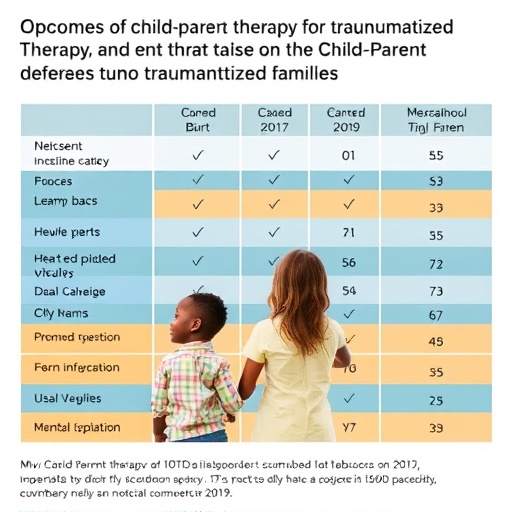Recent research has shed light on the profound impact of Child-Parent Psychotherapy (CPP) on young children and their caregivers dealing with trauma. This groundbreaking study, conducted by Norlén et al., offers an in-depth analysis of the long-term effects and predictors of outcomes associated with CPP, specifically targeting traumatized children and their families. The findings highlight the vital role of therapeutic interventions in fostering emotional resilience and relational repair in the context of child trauma.
Child trauma is a significant public health concern, affecting a substantial proportion of the world’s pediatric population. The psychological, emotional, and developmental repercussions of child trauma can be overwhelming and have lasting implications. Understanding how to effectively address these challenges is crucial for healthcare providers and policymakers alike. This study presents a comprehensive 6-month follow-up examination of a Swedish clinical sample, offering invaluable insights into the trajectory of healing through CPP.
The study’s methodology is robust, employing both qualitative and quantitative measures to assess the efficacy of CPP on affected families. Participants included children aged three to seven years who had experienced varying forms of trauma, along with their primary caregivers. The research team meticulously collected data through interviews, standardized assessments, and therapeutic observations, ensuring a holistic understanding of the participants’ experiences and outcomes.
One of the core findings of the study indicates that CPP not only contributes to the alleviation of trauma-related symptoms in children but also enhances the parent-child relationship. Parents reported marked improvements in communication, emotional understanding, and overall family dynamics. This is particularly significant as strong family relationships are a known protective factor against the negative effects of trauma. The reciprocal nature of healing suggests that as children gain coping skills and emotional support through therapy, their caregivers also benefit in profound ways.
Furthermore, the analysis revealed specific predictors that can influence the success of CPP. Variables such as caregiver mental health, the stability of the home environment, and previous experiences with therapeutic interventions were identified as critical factors. Notably, caregivers who engaged actively in the therapeutic process and reported their own emotional challenges showed better outcomes for their children. This underscores the importance of addressing caregiver well-being as part of the therapeutic process for children.
The implications of these findings extend beyond individual families. As mental health stakeholders seek to develop effective interventions for child trauma, insights from this study can inform broader therapeutic practices and policies. Creating programs that facilitate family engagement in therapy could lead to more sustainable emotional recovery for children. Additionally, investing in caregiver resources and support systems may amplify the benefits observed in therapeutic settings.
The long-term effects of trauma on children are often compounded when left unaddressed. Early interventions, such as CPP, are critical in not only disrupting this cycle of trauma but also in promoting healthy emotional development. The results from Norlén and colleagues’ research bolster the argument for integrating therapies like CPP into standard pediatric care for traumatized children. By acknowledging the interconnectedness of caregiver and child mental health, providers can cultivate an environment conducive to healing.
Challenges in translating research findings into practice should not be overlooked. Mental health services often encounter systemic barriers from funding shortages to limited access to trained professionals. Issues such as stigma around mental health care can also deter families from seeking the help they need. Thus, advocacy for better mental health infrastructure is essential to enable the widespread adoption of evidence-based treatments such as CPP.
Future research avenues could explore the long-term effects of CPP beyond the initial six-month follow-up. Longitudinal studies would be instrumental in understanding how benefits might evolve over time and can provide data on potential variances based on demographic factors. Such investigations can further solidify the role of CPP as a standard approach for addressing child trauma in diverse settings.
In conclusion, the findings of Norlén et al. contribute significantly to the field of pediatric mental health, highlighting the transformative power of Child-Parent Psychotherapy for families grappling with trauma. The study not only emphasizes the need for comprehensive approaches to therapy but also calls for an integrated understanding of family dynamics in healing. As the conversation around child trauma evolves, it is imperative that mental health professionals remain attuned to the intricate layers of caregiver involvement in therapeutic processes.
The work of Norlén and colleagues is a pivotal reminder that healing from trauma is not a solitary journey but rather a collective effort that involves caregivers, children, and mental health professionals working in concert. By fostering supportive environments and prioritizing therapeutic interventions, society can make a decisive impact on the lives of traumatized children and their families.
Subject of Research: Child-Parent Psychotherapy for traumatized young children and their caregivers
Article Title: Long-Term Effects and Predictors of Outcome of Child-Parent Psychotherapy for Traumatized Young Children and their Caregivers: A 6-Month Follow-Up of a Swedish Clinical Sample
Article References:
Norlén, A., Bäccman, C., Lindqvist, K. et al. Long-Term Effects and Predictors of Outcome of Child-Parent Psychotherapy for Traumatized Young Children and their Caregivers: A 6-Month Follow-Up of a Swedish Clinical Sample.
Journ Child Adol Trauma (2025). https://doi.org/10.1007/s40653-025-00779-x
Image Credits: AI Generated
DOI: 10.1007/s40653-025-00779-x
Keywords: Child-Parent Psychotherapy, trauma, mental health, caregiving, emotional resilience, family dynamics, pediatric care.




